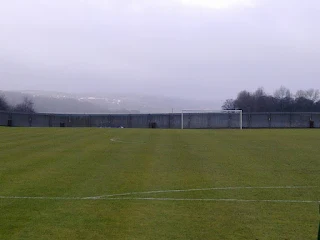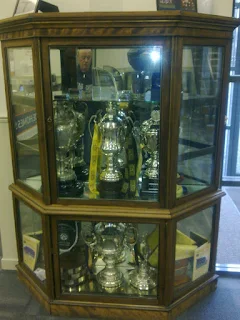Dumbarton FC is a professional football club from the town of the same name on the north bank of the River Clyde, to the west of Glasgow, and is the third oldest club in Scotland, having been formed in 1872.
The club played matches at several home grounds in their formative years, such as Meadow Park Broadmeadow, Ropework Lane, Broomfauld Park, Lowmans Park on Glasgow Road and Private Park Townend, prior to moving into Boghead Park just off Round Riding Road in 1879.
Dumbarton reached the Scottish Cup finals in 1880-81 and 1881-82, losing both matches after replays to Queen’s Park, 3-1 and then 4-1, before lifting the trophy 2-1 after a replay against neighbours Vale of Leven in 1882-83 with goals from Robert S Brown and Robert P Brown at the original Hampden Park.
As reigning Scottish Cup holders, they met the FA Cup winners, Blackburn Olympic, beating them 6–1 in front of a crowd of 3,000 at Boghead Park to be hailed as champions of Great Britain. Dumbarton returned to the final of the Scottish Cup in 1886-87 when they were defeated 2-1 by Hibernian.
They then ended up as runners-up for a fourth time in 1890-91 when Heart of Midlothian won with a solitary goal. ‘The Sons’, which comes from the phrase 'Sons of The Rock', a term used for those born in the town of Dumbarton, became joint champions with Rangers of the inaugural Scottish Football League in 1890-91 before becoming outright champions in 1891-92.
The team struggled in the league before reaching the 1896-97 Scottish Cup final, going down 5-1 to Rangers at the second incarnation of Hampden Park. The club dropped out of the Scottish League at the end of the season, as a reluctance to embrace professionalism saw talent move elsewhere.
Dumbarton continued to enter the Scottish and Dumbartonshire Cup while playing friendly matches before joining the Scottish Combination League and then re-joining Division Two of the Scottish League for the 1906-07 campaign, where they ended as runners-up the following season as Johnny Hill led the scoring.
The goals of John Rowan helped the team to the Division Two title in 1910-11 before the days of automatic promotion. Dumbarton were promoted in 1912-13 despite only finishing sixth in the league before James Collins was brought in as the first-ever team manager.
George Livingstone took over team affairs in 1919 as the Sons continued a series of mid-table finishes prior to the appointment of Paddy Travers, who was at the helm when Dumbarton were relegated in 1921-22 despite the high scoring of Jock Wood. Donald Colman was appointed as manager before the secretary, Fred Donovan, took over in 1931 until January 1939.
Jimmy Smith had a season in charge before World War II; thereafter, Jackie Milne and then William Guthrie took up the post while the Sons continued in the central sector of Division Two. William Irvine was the next manager from June 1950, after a couple of seasons of poor performances, with his arrival seeing an upturn on the pitch before he was replaced by Peter McGown in May 1954, as a new board of directors saved the club from extinction.
Hugh Gallacher’s goals in 1955-56 helped his side to fourth place, a finish that was repeated in 1957-58 as well as twelve months later. Willie Toner came in as boss in 1964 after a couple of previous brief-lasting managers, lasting three years before Ian Spence and then Jackie Stewart took over. His team ended fourth in 1970-71 with Kenny Wilson putting away the goals before Dumbarton lifted the title in 1971-72.
The team settled in the First Division under Alex Wright but finished outside the top ten when the leagues were restructured for the 1975-76 campaign, with the Sons placed in the second tier First Division. Murdo MacLeod and Ian Wallace starred along with future Rangers and Scotland manager Walter Smith as Davie Wilson came in as manager in July 1977.
Graeme Sharp started a fine career at Boghead before being sold to Everton in 1980. Former Celtic hero Sean Fallon took charge of the team for the 1980-81 season before being replaced by Billy Lamont. Dumbarton were promoted in 1983-84 after Wilson had returned for a second spell as manager, helped by the goals of Joe Coyle.
The clubs’ spell in the Premier Division lasted just one season, with the rest of the decade seeing five different managerial appointments, with the Sons going down a further level in 1987-88 before a returning Lamont took charge of the side in April 1990. Dumbarton were crowned as Second Division champions in 1991-92 with Jimmy Gilmour top scoring before the team dropped back down in 1993-94 under former starlet MacLeod.
However, he remained in charge and led his side to promotion as Second Division runners-up the following season as Martin Mooney put away the goals. Jim Fallon arrived as manager soon after. He couldn’t save Dumbarton from another demotion, yet worse was to come as the Sons went down to the fourth level, Third Division in 1996-97 after Ian Wallace had returned after a fine playing career.
After finishing bottom of the Scottish League, the club began to gradually recover. At the end of the 1999-00 season, the club said goodbye to Boghead Park, which had deteriorated badly through a lack of maintenance. Dumbarton sold the land for housing development, shared Cliftonhill with Albion Rovers for the first few months of the 2000-01 season before moving into the brand new Dumbarton Football Stadium.
Tom Carson was manager when the new venue opened, leading the team to Third Division runners-up in 2001-02 when Paddy Flannery ended as top scorer. David Winnie and then Brian Fairley had spells as team boss before the appointment of Paul Martin in December 2004.
He was replaced by Gerry McCabe after the Sons went down in 2005-06, before being replaced by Jim Chapman in December 2007. Jim Chapman led Dumbarton to the Third Division title in 2008-09 with Ross Clark up front.
Jon McShane became the new goalscoring hero after Alan Adamson was appointed manager in October 2010, as the team reached the play-offs in 2011-12, defeating Arbroath before hammering Airdrie United 6-2 on aggregate to seal promotion in a season in which the forward partnership of Bryan Prunty and Scott Agnew blossomed.
Ian Murray took over as manager in November 2012 as the team settled into second-tier football in the Championship, with Stephen Aitken taking over team matters in May 2015, as Robert Thomson led the Sons scoring chart in 2016-17.
Andy Dowie skippered the team that failed to survive the relegation play-offs in 2017-18. Arbroath were beaten before Alloa Athletic won the final on aggregate. Jim Duffy came in as the new manager, as Ross Forbes was given the armband as the Sons ended 2018-19 in sixth place in League One.
Dumbarton were in the same place with Isaac Layne as top scorer when the COVID-19 pandemic ended the 2019-20 campaign early. Manager Duffy spent the lockdown recovering from a heart attack in June 2020, helping his side a few months later to escape relegation in the playoffs by defeating Stranraer and Edinburgh City.
Stephen Farrell took charge of the side following the escape. His side went down through the playoffs, going on to reach Division Two in 2022-23 in the quest for promotion. Any hopes were quickly extinguished in the semi-final by Annan Athletic. 2023-24 saw victories over Stirling Albion and The Spartans in the playoffs, which returned the Sons to League One.
However, severe financial worries off the pitch were to affect the 2024-25 campaign. The team was deducted fifteen points as the club entered administration. Fans rallied, and money was donated to keep Dumbarton alive before a Canadian electronics businessman, Mario Lapointe, bought the club, which was restructured.
Frank McKeown was appointed as manager in December 2025.
Dumbarton FC will play in Scottish League Two in the 2025-26 season.
Wednesday 27th January 2010
What a superb ambassador this gent was. It really gladdened my heart to be in such company when one considers some of the terrible people in charge at some clubs. Everyone made me extremely welcome. I did get a lift back to the station, and I did make my train.











No comments:
Post a Comment